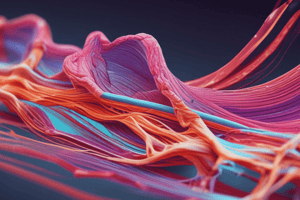Podcast
Questions and Answers
What is the primary function of a muscle fiber?
What is the primary function of a muscle fiber?
- Contraction (correct)
- Secretion
- Nerve impulse transmission
- Cell respiration
The sarcolemma is the membrane surrounding a nerve cell.
The sarcolemma is the membrane surrounding a nerve cell.
False (B)
What is the cytoplasm of a muscle fiber known as?
What is the cytoplasm of a muscle fiber known as?
sarcoplasm
The __________ is responsible for muscle contractions.
The __________ is responsible for muscle contractions.
Match the following components with their functions:
Match the following components with their functions:
Flashcards are hidden until you start studying
Study Notes
Muscle Fiber
- A muscle fiber is a single muscle cell
- A muscle fiber is encased by a membrane called the sarcolemma
- The cytoplasm of a muscle fiber is called sarcoplasm
- Muscle fiber contraction is triggered by a nerve impulse
- Nerve impulses trigger the release of calcium from the sarcoplasmic reticulum
- The sarcoplasmic reticulum is a network of tubules within the muscle fiber that stores calcium
- Calcium is required for muscle contraction
- Calcium binds to troponin, which is a protein in the muscle cell
- Troponin shifts the position of tropomyosin
- Tropomyosin is another protein that blocks the myosin binding sites on the actin filament
- Myosin is a motor protein that binds to actin
- Actin and myosin are proteins that form the contractile filaments in muscles
- Actin filaments are thin filaments in the muscle cell
- Myosin filaments are thick filaments in the muscle cell
- The binding of myosin to actin initiates a power stroke, which causes the muscle fiber to shorten and contract
The H Zone
- The H zone is the central section of a sarcomere that contains only myosin filaments, no actin filaments
- The sarcomere is the basic unit of muscle contraction
- The H zone disappears during muscle contraction
Muscle Contraction
- A single muscle contraction is called a twitch
- Muscle contraction is initiated by a nerve impulse
- The nerve impulse is transmitted to the muscle fiber at the neuromuscular junction
- The neuromuscular junction is the site where a motor neuron synapses with a muscle fiber
- Motor neurons are nerve cells that control muscle movement
Muscle Types
- Muscle fibers are classified into three types: fast-twitch, slow-twitch, and intermediate fibers
- Type 1 muscle fibers (Slow-twitch fibers) are adapted for endurance exercise
- Type 2 muscle fibers (Fast-twitch fibers) are better suited for short bursts of high-intensity exercise
- Intermediate fibers are a hybrid of slow-twitch and fast-twitch fibers.
Nerve Impulse Transmission
- The nerve impulse is transmitted across the neuromuscular junction by chemical messengers called neurotransmitters
- The primary neurotransmitter at the neuromuscular junction is acetylcholine
- Acetylcholine binds to receptors on the muscle fiber, triggering the release of calcium from the sarcoplasmic reticulum
- Calcium binding to troponin enables the formation of cross-bridges between actin and myosin
- The release of calcium from the sarcoplasmic reticulum is essential for muscle contraction
Studying That Suits You
Use AI to generate personalized quizzes and flashcards to suit your learning preferences.




